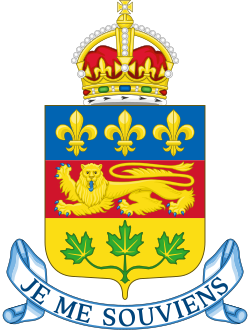| 40th Quebec Legislature | |||
|---|---|---|---|
| Minority parliament | |||
| October 30, 2012 – March 5, 2014 | |||
 | |||
| Parliament leaders | |||
| Premier | Pauline Marois | ||
| Leader of the Opposition | Jean-Marc Fournier 2012-2013 | ||
| Philippe Couillard 2013-2014 | |||
| Party caucuses | |||
| Government | Parti Québécois | ||
| Opposition | Liberal | ||
| Recognized | Coalition Avenir Québec | ||
| Unrecognized | Québec solidaire | ||
| Members | 125 MNA seats | ||
| Sovereign | |||
| Monarch | Elizabeth II 6 February 1952 – 8 September 2022 | ||
| Lieutenant Governor | Pierre Duchesne 7 June 2007 – 24 September 2015 | ||
| Sessions | |||
| 1st session October 30, 2012 – March 5, 2014 | |||
| |||
The 40th National Assembly of Quebec consisted of those elected in the 2012 general election and two by-elections in December 2013. Pauline Marois (PQ) was the premier. The leader of the opposition changed twice. Jean-Marc Fournier (Liberal) started as leader of the opposition after the resignation of former Liberal Premier Jean Charest who lost his seat in the last provincial election. Philippe Couillard was elected Liberal leader and won election to the assembly in a by-election on December 9, 2013. The assembly was dissolved on March 5, 2014.